The age of influencers
Scrolling through social media, we’re used to seeing influencers telling us what to buy, what to wear and who to follow.
De-influencing
However, more recently, videos of influencers telling their followers what not to buy, have been overflowing TikTok. It’s called ‘de-influencing’ and it’s everywhere.
Image: TikTok
What is de-influencing?
‘De-influencing’ is a term invented by creators who are urging viewers not to buy something, or calling criticism to cult-favorite products.
Image: TikTok
52 billion views
The term first appeared at the start of 2023 on TikTok and the hashtag now has more than 52 billion views.
Criticizing overconsumption and overpriced products
De-influencers also criticize overconsumption and question the price of products, many of them also showing cheaper alternatives to their expensive counterparts.
Image: TikTok
Just another marketing strategy?
This makes influencers seem more honest and authentic. But are they really? Or is it just another marketing strategy?
Regain their audience
Alex Paquin, the founder of the ad agency Zerotrillion, told Insider that a lot of influencers are jumping onto this trend to earn back some authenticity credit with their audiences.
De-influencing = influencing?
Moreover, influencing and de-influencing are seen by many, including creators, as two sides of the same coin.
Moving between extremes
"Telling someone a product is perfect for everyone (imposible) drives just as much outrage as telling someone a product is the worst,” writes Charlotte Palermino, a beauty influencer on Instagram.
Balance and nuance= authentic de-influencing
“When I see balance and nuance perform well…that's when I'll believe we're officially 'de-influencing,'" added Palermino.
Telling someone not to buy something is influencing
TikToker Alyssa Kromelis, now famous for showing her followers cheaper alternatives to expensive products, has admitted that telling someone not to buy something is just as ‘influencing’ as telling someone to buy something else.
Image: TikTok
Joining the trend vs resisting it
Furthermore, advertising certain products, even if negatively, can lead to ‘cookies’ showing consumers the positive advertising of the product as well, persuading them equally to join a trend and to resist it.
Image: TikTok
No such thing as bad publicity?
There’s a famous saying that claims that there is no such thing as bad publicity, and in the case of de-influencing, it might just be accurate.
Influencing and de-influencing both create engagement
As some creators are pointing out, bashing a product can be as shallow as touting a product and both serve the creator by driving engagement.
Image: TikTok
De-influencing doesn’t promote conscious consumption
Moreover, de-influencing doesn’t offer any nuances or helpful information about changing consumption practices, according to many creators.
Image: TikTok
Influencing is incompatible with promoting less consumption
In fact, being an influencer is incompatible to promoting less consumption, according to Victoria Paris, an influencer who got famous by selling her used clothes.
Image: TikTok
People want to buy sustainability
Paris explained to The Rolling Stone that even by advertising a lifestyle of sustainability, people want to buy her clothes and that a simple video can lead to mass consumption of a product.
Image: TikTok
Overconsumption is a much bigger problem
But even the practice of individual conscious consumption won’t end the huge problem that is overconsumption, experts say.
Producers need to be held responsible
Even though achieving collective conscious consumption would be great, producers ought to be held responsible too, not just by social pressure but also through legal frameworks.
Circular economies
In addition, we’d need systemic changes that would shift societies into circular economies and reduce the production and use of goods harmful to the environment and, ultimately, to people.
Questioning de-influencing
Many experts have offered radical solutions to overconsumption, but in the meantime, as individuals, we should question our consumption habits and of course, de-influencing, just as much as influencing.


































